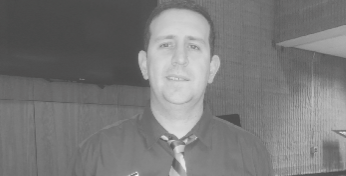By Anastasia Fox
Staff Writer
It can start with something as simple and small as a brown napkin, or replacing a plastic plate with a paper plate or not wasting food. Aramark, the main food provider for campus dining locations including Hillwood Café, Twisted Taco, Subway, End Zone, and Winnick Student Center, includes locally sourced foods in 24 percent of their dishes.

Justin Poly, food service director
To some students, sustainability means recycling, turning the faucet off when you’re brushing your teeth and not leaving the television on during class. For more than two years, Post’s sustainability committee has worked to drive more focus and student awareness towards healthy living and eating. So why don’t more people know about it?
“There’s waste everywhere, it’s just about being efficient,” Justin Poly, food service director and former executive chef at Winnick Student Center, said. Small steps have been taken towards reducing the amount of waste we produce on campus, like recycling cardboard and fry oil. But with the adoption of the new “Green Thread” program, Aramark is hoping to reach its “20 by 20” goal and reduce the calories on the Winnick menu 20 percent by the year 2020. This year alone, they were able to reduce the number of calories by eight percent, making 30 percent of their main dishes either vegetarian or vegan.
Aramark’s goal is to reduce the environmental impact within their operations and continuously improve their own practices while offering expertise and practical solutions. The two main focuses are source reduction and food donations. Source reduction aims to minimize waste before it’s generated by accurately tracking 100 percent of the food thrown away and not eaten, while surplus food is donated to those in need; this is in partnership with the Food Donation Connection (FDC), a privately owned company that partners with restaurants and food service providers to donate the food to local hunger relief agencies in the community.
The Green Thread approach is derived directly from the United States Environmental Protection Agency’s (EPA) food waste hierarchy, which aims to reduce waste directly from the source. Whenever possible, Aramark purchases seasonal and responsibly grown and sourced produce. The campus is less than 300 miles away from local produce and community-based producers.
By 2018, Aramark aims to purchase 100 percent sustainable seafood from sources that can maintain or increase production without jeopardizing the ecosystem. Aramark already switched over to cage-free shell eggs in 2015, and will transition completely to liquid eggs, a natural blend of egg white and egg yolk, by 2020.
Looking towards the future, there is still more that can be done. Aramark has several interactive programs to get students more involved. These programs include Recycle Mania, Campus Crunch and “Veg Out” events.
To get involved, students can contact Dr. Carlin with the sustainability committee at Scott.Carlin@liu.edu or Justin Poly at Poly-Justin@aramark.com




Be First to Comment